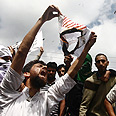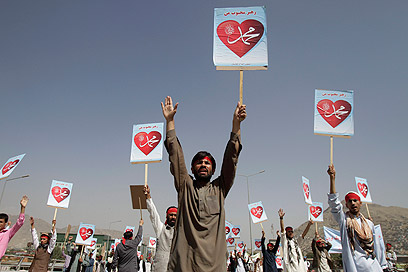
Egypt court sentences 8 to death over prophet film
Egyptian Coptic Christians, Florida-based American pastor convicted in absentia of harming national unity, insulting Islam
An Egyptian court has convicted in absentia seven Egyptian Coptic Christians and a Florida-based American pastor and sentenced them to death on charges linked to an anti-Islam film that had sparked riots in parts of the Muslim world.
Egypt's official news agency said the court found the defendants guilty Wednesday of harming national unity, insulting and publicly attacking Islam, and spreading false information. The charges carry the death sentence in Egypt.
Related articles:
- Clinton: US had nothing to do with film
- Caricatures blame Israel, US for incendiary film
- Al-Qaeda: Kill US diplomats over anti-Islam film
The case was largely symbolic since the seven men and one woman are outside of Egypt and unlikely to travel to the country to face the charges. The trial was seen as an attempt to absorb public anger over the film, which portrays the Prophet Mohammad as a fraud, womanizer and buffoon.
The Egyptian-born Coptic Christian who made the anti-Islam film that sparked protests across the Muslim world told the New York Times recently that has no regrets about his insulting portrayal of the Prophet Mohammad.

Protests against film in Afghanistan (Archive photo: AP)
In his first public comments since the 14-minute trailer for his film, "Innocence of Muslims," gained notoriety in September, Mark Basseley Youssef told the newspaper he wanted to reveal what he called "the actual truth" about Mohammad and raise awareness of the violence committed "under the sign of Allah."
The film portrayed Mohammad as a womanizer, ruthless killer and child molester. The film touched off a torrent of anti-American unrest in Arab and Muslim countries. For many Muslims, any depiction of the prophet is considered blasphemous.
In explaining his reasons for the film, he cited "atrocities" by Muslims. After a Muslim gunman killed 13 people at Fort Hood, Texas in 2009, "I became even more upset and enraged," he said in written comments conveyed to the Times through his attorney. A Times request to interview him in person was blocked by prison authorities.
"I thought, before I wrote this script that I should burn myself in a public square to let the American people and the people of the world know this message that I believe in," said Youssef.
Reuters contributed to the report
- Follow Ynetnews on Facebook and Twitter
- Receive Ynetnews updates directly to your desktop










